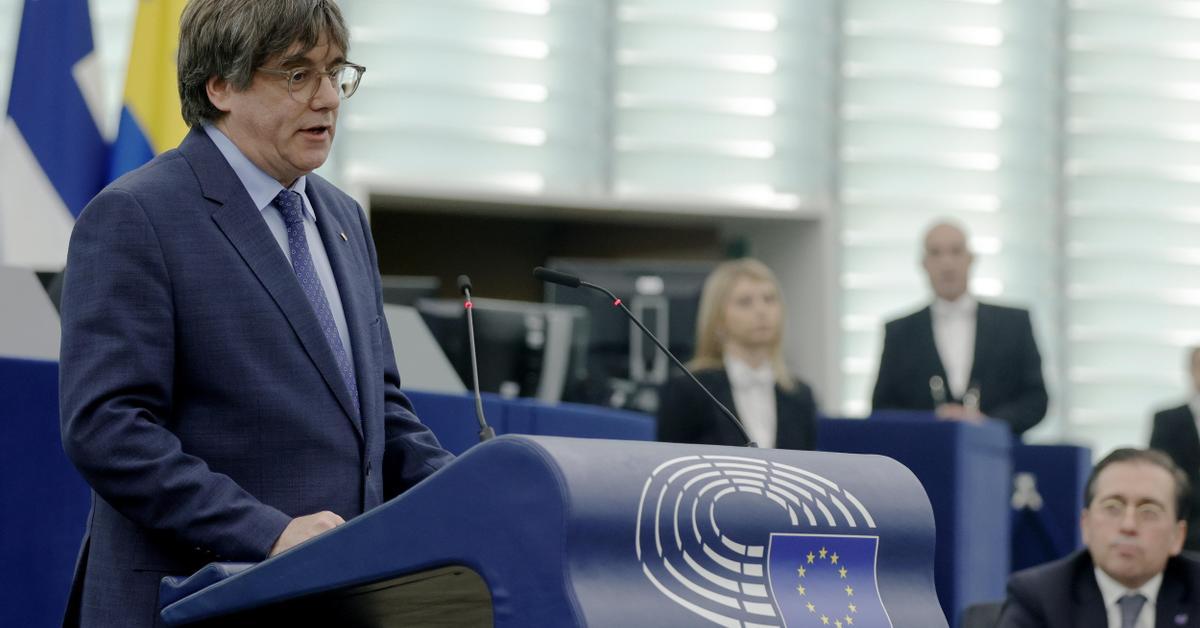
A new judicial front is reactivated that could circumvent the amnesty law. The judge in the Voloh case has decided to give a boost to the investigation of the Russian plot of the process and has insisted on implicating the former president of the Generalitat Carles Puigdemont in Russia’s alleged attempt to influence the independence of Catalonia in 2017 as way to destabilize the European Union.
In an order, Judge Joaquín Aguirre agrees to extend the investigation of the Voloh case for six months one day before Congress debates whether to approve the amnesty law. Although the judge does not explain what specific crime is being investigated in the Russian plot, from the description of the meetings and messages he makes it is clear that the facts exposed could fit into the section of the Penal Code that punishes illegal relations with foreign governments and their intelligence services. This assumption is one of those excluded from the amnesty, according to the latest draft of the norm that will be voted on this Tuesday.
In his resolution, the instructor only details one new piece of evidence (an anonymous letter he received in December of last year). The rest of the elements had already been in the court for years, although the instructor points out that there is still “abundant administrative documentation to be reviewed” as well as “voluminous reports sent” by the Civil Guard. The judge explains that, today, it is “impossible to predict” what procedures will have to be carried out once everything has been analyzed.
The elements available to the judge have been known for years. In the framework of an anti-corruption case in the Barcelona Provincial Council, the judge launched operation Voloh in 2020. There were discovered several messages and documents from the former secretary of international relations of Convergència, Víctor Terradellas, who admitted before the judge that he had insisted on the Palau de la Generalitat in the critical days of 2017 to meet with two Russian emissaries, who he considered close to the Kremlin.
In the three meetings, all of them brief and taking place between October 20 and 26, one day before the failed declaration of independence, the Russians first proposed to Puigdemont’s then collaborator, Elsa Artadi, and to the president himself economic and even military in the face of eventual independence. They were the known 10,000 Russian soldiers, to whom Puigdemont did not give any credibility, according to Terradellas himself.
Russian contacts
In one of the October 2017 conversations between Terradellas and Puigdemont that are part of the case, the former head of international relations at CDC reproached the president that no one from Palau had “listened” to his Russian contacts, to which Puigdemont remarked that he had no “conviction” about its viability. Terradellas insisted on meeting the then president in person.
According to the judge, Puigdemont and members of his entourage maintained “close personal relationships” with German and Italian far-right politicians and with Russia, willing to support “economically and militarily” the independence of Catalonia.
The judge believes that Puigdemont’s entourage worked to develop its “own legislation on cryptocurrencies appropriate to Russian interests” and concludes that Russia had an interest in the process due to its purpose of “destabilizing the European Union.” For this reason, he advocates checking “the veracity” of the agendas and mobile phone of Terradellas and other investigated people to see if “more relevant data appears” or “indications relating to the support that Russia could have given to the independence process of Catalonia in exchange for compensation.” ”.
Without explicitly mentioning Puigdemont, the judge points to the former president by stating that “the deduction can be drawn” that “there was some common person above” Terradellas and Artadi who allowed the Generalitat and Convergènca to contact the Kremlin.
After reviewing the documentation of the case, the magistrate assures that he has found “data that identifies people and would confirm the close personal relationships existing between some of those investigated with individuals of Russian, German or Italian nationality”, some of them while they held diplomatic positions. and they had relations with the Russian secret services.
On the other hand, the judge relies on the 2018 messages between Terradellas and Jordi Sardà, supposed interpreter and liaison with Russia, to maintain that the contacts in the Kremlin “must have been of a very high level” because it is “intuited” that the former leader of CDC knew that Russia’s invasion of Ukraine is going to begin. The intercepted chats, adds the instructor, indicate that Terradellas wanted “a Catalan personality” whose name is not specified to travel to Russia to explain the Kremlin’s “offers” to Catalonia.
Another of the assumptions that the judge is investigating within the alleged Russian plot are the messages that Gonzalo Boye, Puigdemont’s lawyer, would have exchanged with the head of the former president’s office, Josep Lluís Alay, and which according to the instructor reveal “unequivocally his contacts with senior Kremlin leaders”, since they indicated that the former head of the Government should not criticize Vladimir Putin for the case of the dissident Navalny or the president of Belarus, Viktor Lukashenko.
In the judge’s opinion, Alay and Boye also traveled to Russia to “meet with the highest bosses of the Russian mafia, such as Zakhar Kalashov, Vasili Kristoforov, Koba Shermazashivili and, possibly, also with Evgeni Primakov, a relevant politician in the Kremlin. ”.
Source: www.eldiario.es

